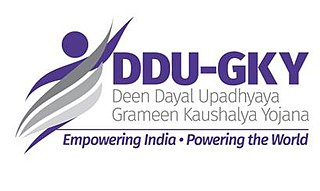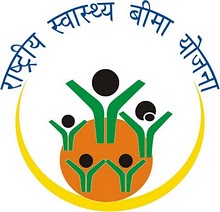 W
WAtal Pension Yojana, formerly known as Swavalamban Yojana is a government-backed pension scheme in India, primarily targeted at the unorganised sector. It was mentioned in the year 2015 Budget speech by the Finance Minister Arun Jaitley. It was launched by Prime Minister Narendra Modi on 9 May 2015 in Kolkata.
 W
WBeti Bachao, Beti Padhao is a campaign of the Government of India that aims to generate awareness and improve the efficiency of welfare services intended for girls in India. The scheme was launched with an initial funding of ₹100 crore (US$13 million). It mainly targets the clusters in Uttar Pradesh, Haryana, Uttarakhand, Punjab, Bihar and Delhi.
 W
WGrameen Kaushalya Yojana or DDU-GKY is a Government of India youth employment scheme.
 W
WPradhan Mantri Matru Vandana Yojana (PMMVY), previously known as the Indira Gandhi Matritva Sahyog Yojana, is a maternity benefit program run by the government of India. It was originally launched in 2010 and renamed in 2017. The scheme is implemented by the Ministry of Women and Child Development. It is a conditional cash transfer scheme for pregnant and lactating women of 19 years of age or above for the first live birth. It provides a partial wage compensation to women for wage-loss during childbirth and childcare and to provide conditions for safe delivery and good nutrition and feeding practices. In 2013, the scheme was brought under the National Food Security Act, 2013 to implement the provision of cash maternity benefit of ₹6,000 (US$80) stated in the Act. Presently, the scheme is implemented on a pilot basis in 53 selected districts and proposals are under consideration to scale it up to 200 additional 'high burden districts' in 2015–16. The eligible beneficiaries would receive the incentive given under the Janani Suraksha Yojana (JSY) for Institutional delivery and the incentive received under JSY would be accounted towards maternity benefits so that on an average a woman gets ₹6,000 (US$80)
 W
WJammu Suraksha Yojana is a collaborative initiative by REIT under ITI Limited and Jammu Municipal Corporation. This is started to provide digital security and surveillance products to the citizen of Jammu at subsidized prices. As a mega initiative, REIT is providing Personal security, financial security and civil security to the citizens of Jammu. It has planned to provide digital security to the citizen of Jammu at very reasonable rates. The citizens can also avail life insurance up to Rs 1,00,000 in case of death. Jammu Suraksha Yojana is the first initiative taken by the government department for general public security. The Scheme is launched by the Deputy Mayor JMC, Purnima Sharma, JMC Commissioner Pankaj Magotra KAS and officials from ITI Limited.
 W
WKhelo India: National Programme for Development of Sports, branded as Khelo India, aims at improving India's sports culture at the grass-root level through organized talent identification, structured sporting competitions and infrastructure development. It is a Government of India programme launched in 2017-18 under the tenure Prime Minister Narendra Modi and Sports Minister's Vijay Goel and Rajyavardhan Singh Rathore.
 W
WKishore Vaigyanik Protsahan Yojana (KVPY) is a scholarship programme funded by the Department of Science and Technology of the Government of India, aimed at encouraging students to take up research careers in the areas of basic sciences. It offers scholarships and contingency grants up to the pre-Ph.D. level to selected students. Begun in 1999, it is administered by the Indian Institute of Science. The students who qualify in the KVPY Exam are eligible for a fellowship as well as admissions into institutes like the IISc and the IISER based on additional criteria. This exam has 3 Streams: SA, SX, and SB. Streams SP Basic Sciences and SP Medicine were discontinued since 2012-13. The KVPY application process consists of four steps: Registration, Application Form submission, Fee Payment and checking application Status.
 W
WThe Midday Meal Scheme is a school meal programme in India designed to better the nutritional standing of school-age children nationwide. The programme supplies free lunches on working days for children in primary and upper primary classes in government, government aided, local body, Education Guarantee Scheme, and alternate innovative education centres, Madarsa and Maqtabs supported under Sarva Shiksha Abhiyan, and National Child Labour Project schools run by the ministry of labour. Serving 120 million children in over 1.27 million schools and Education Guarantee Scheme centres, the Midday Meal Scheme is the largest of its kind in the world.
 W
WThe National Service Scheme (NSS) is an Indian government-sponsored flagship for public service program conducted by the Ministry of Youth Affairs and Sports of the Government of India. Popularly known as NSS, the scheme was launched in Gandhiji's Centenary year in 1969. Aimed at developing student's personality through community service, NSS is a voluntary association of young people in Colleges, Universities and at +2 level working for a campus-community linkage.
 W
WThe National Social Assistance Programme (NSAP) is a Centrally Sponsored Scheme of the Government of India that provides financial assistance to the elderly, widows and persons with disabilities in the form of social pensions.
 W
WThe National Youth Festival in India is an annual gathering of youth with various activities including competitive ones. Celebrated to commemorate the birth anniversary of youth icon Swami Vivekananda, it is organized by Ministry of Youth Affairs and Sports, Government of India in collaboration with one of the State Governments. Thus, it is held in a different state each year during National Youth Week, 12 to 16 January every year.
 W
WThe Neer Nirmal Pariyojana (NNP) is a World Bank assisted and funded project undertaken by the Government of India. It was started with an aim to improve piped water supply and sanitation services for selected rural communities in the target states through decentralized service delivery systems. The scheme is being undertaken in the four Indian states, Uttar Pradesh, Bihar, Assam and Jharkhand. It is a joint initiative by the Ministry of Drinking Water and Sanitation (MoDWS), Government of India and the World Bank.
 W
WNirbhaya Fund was an Indian rupee 10 billion corpus announced by Government of India in its 2013 Union Budget. The Finance Minister P. Chidambaram expected the fund to support initiatives protecting the dignity and ensuring safety of women in India. Nirbhaya (fearless) was the pseudonym given to the 2012 Delhi gang rape victim. The Ministry of Women and Child Development and several other ministries decided the application of the fund. One use was to open One Stop Centres to support women who are victims of violence.
 W
WPolice Mitra or Friends of Police is an initiative of the State police in different states of India. Civilian citizens having 'good social record' like ex-army men, students, advocates and housewives are responsible in tying up with the police beat staff to look after the law and order, traffic and crowd management, safety of women prevention of crime and informing about suspected elements around their area. The arm bands and ID cards provided to police mitras give them the authority to help the police in fighting crime without any salary. Police Mitra Kaksh were also set up in Haryana. Police Mitras also assist Government Railway Police (Mumbai)."Mumbai Stations to have 'Police Mitra' for Help – RailNews Media India Ltd". Archived from the original on 27 December 2020. Retrieved 10 March 2020.</ref> Police Mitras are also used in maintaining peace in disturbed areas by police department.
 W
WThe Pradhan Mantri Gram Sadak Yojana (PMGSY) is a nationwide plan in India to provide good all-weather road connectivity to unconnected villages. Of 178,000 habitations with a population of above 500 in the plains and above 250 in the hilly areas planned to be connected by all-weather roads, 82% were already connected by December 2017 and work-in-progress on the remaining 47,000 habitations was on-track for completion by March 2019.
 W
WPradhan Mantri Gramin Awas Yojana (PMRHS); lit. 'Prime Minister's Rural Housing Scheme'), previously Indira Awas Yojana, is a social welfare programme, created by the Indian Government, to provide housing for the rural poor in India. A similar scheme for urban poor was launched in 2015 as Housing for All by 2022. Indira Awas Yojana was launched in 1985 by Rajiv Gandhi, the then Prime Minister of India, as one of the major flagship programs of the Ministry of Rural Development to construct houses for BPL population in the villages.
 W
WPradhan Mantri Jan Dhan Yojana is a financial inclusion program of the Government of India open to Indian citizens, that aims to expand affordable access to financial services such as bank accounts, remittances, credit, insurance and pensions. This financial inclusion campaign was launched by the Prime Minister of India Narendra Modi on 28 August 2014. He had announced this scheme on his first Independence Day speech on 15 August 2014.
 W
WPradhan Mantri Kaushal Vikas Yojana (PMKVY) is a skill development initiative scheme of the Government of India for recognition and standardisation of skills.
 W
WPradhan Mantri Kisan Samman Nidhi is an initiative by the government of India in which all farmers will get up to ₹6,000 per year as minimum income support. The initiative was announced by Piyush Goyal during the 2019 Interim Union Budget of India on 1 February 2019. The scheme has cost ₹75,000 crore per annum and has come in effect from December 2018. ₹6000 per year will be paid to each eligible farmer in three instalments and will be deposited directly to their bank accounts.
 W
WPrime Minister's National Relief Fund (PMNRF) in India is the fund raised to provide support for people affected by natural and man made disasters. Natural disasters covered under this include flood, cyclone, earthquake etc. Man made disasters include major accidents, acid attacks, riots etc. The fund is also allotted to the people for treatment like cancer, kidney transplantation, heart surgery etc. The fund was first consolidated during the time of the first prime minister of republic of India Jawaharlal Nehru.
 W
WRashtriya Swasthya Bima Yojana is a government-run health insurance programme for the Indian poor. The scheme aims to provide health insurance coverage to the unrecognised sector workers belonging to the BPL category and their family members shall be beneficiaries under this scheme. It provides for cashless insurance for hospitalisation in public as well as private hospitals. The scheme started enrolling on April 1, 2008 and has been implemented in 25 states of India. A total of 36 million families have been enrolled as of February 2014. Initially, RSBY was a project under the Ministry of Labour and Employment. Now it has been transferred to Ministry of Health and Family Welfare from April 1, 2015
 W
WSwachh Bharat Mission (SBM), Swachh Bharat Abhiyan, or Clean India Mission is a country-wide campaign initiated by the Government of India in 2014 to eliminate open defecation and improve solid waste management. It is a restructured version of the Nirmal Bharat Abhiyan launched in 2009 that failed to achieve its intended targets.
 W
WUDAN is a regional airport development programme of the Government of India and part of the Regional Connectivity Scheme (RCS) of upgrading underserviced air routes. Its goal is to make air travel affordable and widespread, to boost inclusive national economic development, job growth and air transport infrastructure development of all regions and states of India. At the beginning of the scheme, out of total 486 airports, 406 were participating unserved airports, 27 were well-served airports out of 97 non-RCS airports and 12 were operational airports out of 18 participating underserved regional operational airports with regular fixed-wing scheduled flights. UDAN scheme will add to this number by expediting the development and operationalisation of India's potential-target of nearly 425 unserved, underserved, and mostly underdeveloped regional airports with regular scheduled flights. However, there are several issues and criticisms such as poor infrastructure, dominance by larger airlines and degradation of regional airlines, slow implementation that plague this scheme.